SIAM Announces the 2022 Class of MGB-SIAM Early Career Fellows
SIAM Recognizes Exemplary Achievements through MGB-SIAM Early Career Fellowship
Society for Industrial and Applied Mathematics (SIAM) is pleased to announce the inaugural class of MGB-SIAM Early Career Fellows. These distinguished early career professionals were selected based on their exemplary achievements; support of diversity, equity, and inclusion in their community; and commitment to industrial and applied mathematics, computational science, and data science.
The MSEC Fellowship, established in 2021, reflects a joint commitment by Mathematically Gifted & Black (MGB) and SIAM to promote long-term engagement of MSEC Fellows within SIAM and continued success within the wider applied mathematics and computational sciences community. This program recognizes the achievements of early career applied mathematicians—especially those belonging to racial and ethnic groups historically excluded from the mathematical sciences in the United States—and provides professional activities and career development.
SIAM congratulates these 10 esteemed members of the community. Learn more about them below:
- Keisha Cook
- Kyle Dahlin
- Ranthony A.C. Edmonds
- Samy Wu Fung
- Nicole D. Jackson
- Reginald L. McGee II
- Iván Ojeda-Ruiz
- Joan Ponce
- Ludovic Tangpi
- Oyita Udiani
Keisha Cook, Clemson University
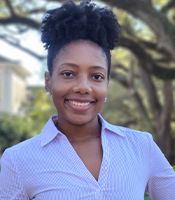
Biography
Dr. Keisha Cook is an assistant professor in the School of Mathematical and Statistical Sciences at Clemson University. She received her Ph.D. in computational mathematics from the University of Alabama and completed a postdoctoral research position at Tulane University. She is a member of the Southeast Center for Mathematics and Biology where she collaborates with a team of mathematicians and experimentalists. Their research group studies intracellular movement in human lung cells. While the experimentalists capture data using various imaging techniques, Dr. Cook simulates the processes occurring inside of cells using mathematical models and develops methodologies to statistically analyze the underlying mechanisms of the cell cytoplasm. The mathematical analysis is used by experimentalists to provide a deeper understanding of intracellular processes and introduce innovative ways to categorize movement.
In addition to research, she teaches courses in probability and stochastic processes. She enjoys service that is a direct reflection of the mentors that played a part in helping her reach her goals throughout her career thus far. She strives to support and mentor underrepresented students, postdocs, and researchers throughout her career in academia. She has a keen interest in increasing the number of women and underrepresented students in STEM.
Why did you apply for this fellowship?
The MGB-SIAM Early Career Fellowship is an advantageous opportunity that will allow me to become more involved in the community of industrial and applied mathematics, as well as build a larger community of Black researchers within SIAM. The academic experiences that I participated in during my postdoctoral research position would not have happened if I did not attend a SIAM conference in 2019 as a newcomer to single particle tracking (SPT).
What are you most looking forward to as an MSEC Fellow?
As an MSEC Fellow, I hope to expand my research program by collaborating with researchers in data science to improve current SPT methodology and incorporate machine learning; and working with industrial and applied mathematicians to expand SPT to systems to larger scales and standardize a methodology for use across disciplines.
Kyle Dahlin, Odum School of Ecology, University of Georgia
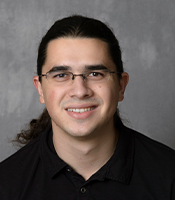
Biography
Dr. Kyle Dahlin is a mathematical ecologist who uses mathematical models to study the ecology of infectious diseases in human and wildlife populations. Originally from the island of Oʻahu, Hawaiʻi, he received a bachelor’s degree in mathematics from the University of Hawai’i at Mānoa and continued to obtain a master’s and Ph.D. in mathematics from Purdue University. Dr. Dahlin is currently a postdoc at the Center for the Ecology of Infectious Diseases of the Odum School of Ecology, at the University of Georgia. His work primarily focuses on using mathematical models to understand how ecological interactions impact the transmission of mosquito-borne pathogens. He is also the co-founder of Indigenous Mathematicians, an organization that seeks to connect and support Native American, Native Alaskan, and Pacific Islander mathematicians.
Why did you apply for this fellowship?
While I have only recently become a SIAM member, I have heard about many of the benefits of being part of the SIAM community from my colleagues over the years. I applied for this fellowship so that I could attend SIAM conferences, particularly the Life Sciences and Mathematics of Planet Earth conferences. These conferences provide opportunities for networking, learning about state-of-the-art interdisciplinary research, and presenting my own work. I also want to organize minisymposia and work as a mentor-judge for student posters and presentations.
What are you most looking forward to as an MSEC Fellow?
I'm most looking forward to networking with and getting to know the other MSEC Fellows in my cohort. Co-mentoring has been an important part of my professional development. I hope to have opportunities to engage in co-mentoring with others in my cohort in my time as an MSEC Fellow.
Ranthony A.C. Edmonds, The Ohio State University

Biography
Dr. Ranthony A.C. Edmonds is a National Science Foundation Mathematical and Physical Sciences Ascending Postdoctoral Researcher at The Ohio State University, and an associate editor at the American Mathematical Monthly. Her research interests include commutative ring theory, applied algebraic topology, data science, and mathematics education. She earned a Ph.D. in mathematics in 2018 from the University of Iowa, an M.S. in mathematical sciences from Eastern Kentucky University in 2013, and a B.A. in English and a B.S. in mathematics from the University of Kentucky in 2011.
Dr. Edmonds uses her passion for storytelling and hidden narratives in STEM to enact her career mission: to increase access to mathematics through community engaged scholarship. In 2019, she co-created the first service-learning course in mathematics at Ohio State, entitled “Intersections of Mathematics and Society: Hidden Figures.” In 2021, she was awarded a Racial Justice Grant as the principal investigator of the project, “Hidden Figures Revealed: Dynamic History and Narratives of Black Mathematicians from The Ohio State University,” which is the first comprehensive study of Black mathematicians at a single U.S. institution.
Why did you apply for this fellowship?
I applied to become an MSEC Fellow to support my development as a mathematician with an applied research program rooted in social justice. This fellowship will help me build community in applied mathematics with other early career mathematicians as I broaden my research program in commutative ring theory to applied algebraic topology. I am also excited to become a member of SIAM and participate in their national conferences.
What are you most looking forward to as an MSEC Fellow?
I am excited about being part of a cohort of other early career people studying applied and computational mathematics. I look forward to the professional development built into this opportunity, and the support this fellowship will offer as I learn how to use mathematical and computational tools to study societal inequities and use my training in this arena to directly facilitate research opportunities for students and faculty who are interested in the intersections of mathematics and society.
Samy Wu Fung, Department of Applied Mathematics and Statistics, Colorado School of Mines
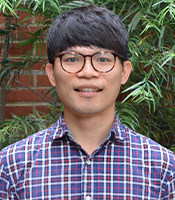
Biography
Dr. Samy Wu Fung is an assistant professor in the Department of Applied Mathematics and Statistics at Colorado School of Mines. Prior to joining Mines, he was an assistant adjunct professor in the Department of Mathematics at UCLA. He received his Ph.D. in applied mathematics from Emory University in 2019. Dr. Fung’s research interests lie in the intersection of applied mathematics and data science. In particular, he is interested in inverse problems, optimization, and deep learning.
Why did you apply for this fellowship?
As an MSEC Fellow, I am given the support to be a more active and contributing member to the SIAM community, especially in terms of helping create a more diverse and inclusive environment.
What are you most looking forward to as an MSEC Fellow?
I look forward to bringing people of different backgrounds and levels of professional experience together by hosting minisymposia.
Nicole D. Jackson, Sandia National Laboratories
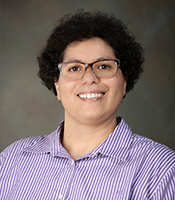
Biography
Dr. Nicole D. Jackson is a systems analysis researcher in the energy water systems integration department at Sandia National Laboratories, where she was also a postdoctoral appointee. Prior to joining Sandia, she received her B.S. and Ph.D. in civil engineering, an M.S. in materials science and engineering from the University of Illinois at Urbana-Champaign, and an M.S. in engineering mechanics from Virginia Tech. Her dissertation work focused on understanding the interaction and response of agricultural trade to extreme weather events such as temperature extrema, heavy rain, and drought. At Sandia, Dr. Jackson’s current research focuses on the resiliency of critical infrastructure to extreme weather events and natural hazards, with an emphasis on renewable energy, water resources, and the electric grid.
Why did you apply for this fellowship?
I was especially interested in the fellowship so that I could jump start my involvement at SIAM as an early career technical professional. While my research interests are focused on extreme weather and natural hazards, computational and data science are at the core of not only how I understand the problem but tackle it. SIAM’s activity groups such as the Mathematics of Planet Earth and Data Science greatly overlap with my technical interests. I thought the fellowship would be a wonderful opportunity to both be more involved in SIAM and further connect with people of similar technical interests.
What are you most looking forward to as an MSEC Fellow?
I am excitedly looking forward to working with the large diversity of other MSEC Fellows, and the plethora of learning opportunities that will be available over the course of the fellowship.
Reginald L. McGee II, College of the Holy Cross
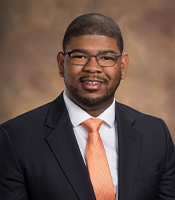
Biography
Dr. Reginald L. McGee II is a proud graduate of Florida A&M University. He went on to obtain a Ph.D. from Purdue University and to complete a postdoctoral fellowship at the Mathematical Biosciences Institute at The Ohio State University. His research program considers questions in immunobiology through modeling and data analysis. In recent years, Dr. McGee has been specifically interested in blood diseases including leukemia and sickle cell disease.
Why did you apply for this fellowship?
While attending the 2017 Workshop Celebrating Diversity, I was inspired by the research presented and efforts at making SIAM more inclusive. I have wanted to get more involved in the society since attending that year and this led me to apply to be an MSEC Fellow.What are you most looking forward to as an MSEC Fellow?I am most looking forward to expanding my network. I am excited to meet and interact with other MSEC Fellows, Workshop Celebrating Diversity participants, and conference attendees in the coming years.
Iván Ojeda-Ruiz, Texas State University
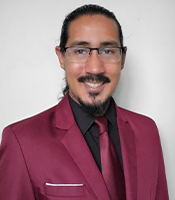
Biography
Dr. Iván Ojeda-Ruiz graduated from the University of Puerto Rico, Rio Piedras, with a bachelor’s degree in mathematics and chemistry, then continued to the University of Texas at Arlington where he completed his Ph.D. in mathematics. Dr. Ojeda-Ruiz is mainly interested in numerical linear algebra with applications in image processing and data clustering. His dissertation thesis was based on Normalized Cut (Ncut) problems with linear constraints. Many methods are used to solve Ncut problems, such as projected power method, lanczos method, augmented Lagrangian Uzawa, etc. He has recently been involved in face recognition and video surveillance applications and has been interested in a few possible frameworks. Dr. Ojeda-Ruiz mainly uses Dynamic Mode Decomposition (DMD), but is familiar with robust principal component analysis and low rank recovery.
Why did you apply for this fellowship?
I have been involved in the SIAM community ever since I started graduate school, and I feel that connection with the community has been diminished since I started working in my current teaching position. I want to build strong roots with the SIAM community, and I believe this fellowship will help me in doing so.
What are you most looking forward to as an MSEC Fellow?
I am definitely looking forward to the talk I will give in one of the Workshop Celebrating Diversity sessions. I have many experiences that have shaped my passion for mathematics and mentoring, and I really want to share the uniqueness of those experiences. I am Puerto Rican, and as a mixture of three races, I believe I can make a great impact in the diversification of the SIAM community.
Joan Ponce, Semel Institute for Neuroscience and Human Behavior, University of California, Los Angeles
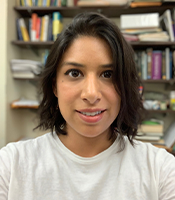
Biography
Dr. Joan Ponce is a postdoctoral scholar at the Semel Institute for neuroscience and human behavior at University of California, Los Angeles. Her research interests lie at the interface between mathematics and biology. She develops and analyzes mathematical models to describe and better predict the evolution of disease dynamics. One of Dr. Ponce’s research interests is exploring different ways of using existing data and developing novel models that can adapt to the ever-changing nature of disease transmission. Public health policies rely on increasingly complex models to approximate epidemics realistically and accurately with the available data. Her primary research interests include dynamical systems, bifurcation analysis, parameter estimation, geospatial modeling, and optimal control.
Dr. Ponce obtained her Ph.D. from Purdue University in 2020 and her B.Sc. in mathematics from the University of Florida in 2013. Her Ph.D. thesis focused on widely used simplifying assumptions and how they impact model outcomes. One key focus of her research consists of using case data to estimate model parameters to track the evolution of an outbreak.
Why did you apply for this fellowship?
For an early career researcher, the SIAM community offers an opportunity to connect with experienced researchers, establish research networks that can lead to productive collaborations, and organize conference sessions to promote equality in the representation of underrepresented minorities in mathematical sciences
What are you most looking forward to as an MSEC Fellow?
Opening the door to researchers from underrepresented minorities is key at an early career stage. Giving talks at conferences is contingent upon receiving an invitation or being successful in applying to give a contributed talk. I look forward to organizing minisymposia to help improve the visibility of talented researchers from underrepresented groups and contribute to increasing diversity in research communities.
Ludovic Tangpi, Department of Operations Research and Financial Engineering, Princeton University
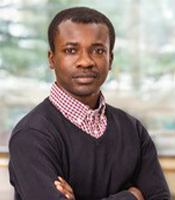
Biography
Since 2018, Dr. Ludovic Tangpi has been an assistant professor of Operations Research and Financial Engineering at Princeton University. His postdoctoral fellowship was in the Department of Mathematics at the University of Vienna, and his Ph.D. between Humboldt University Berlin and University of Konstanz in Germany. Dr. Tangpi’s research interests include stochastic analysis and mathematical finance.
Why did you apply for this fellowship?
I applied for the fellowship because SIAM plays a central role in promoting industrial and applied mathematics in North America at all levels.It is one of the most important scientific organizations in the world, thus I felt privileged to be honored and recognized by SIAM.
What are you most looking forward to as an MSEC Fellow?
I am very excited to be an MSEC Fellow for the next three years. I am planning to use this platform to further contribute to the effort of increasing the participation of minorities in mathematical sciences and engineering at the highest level. By organizing minisymposia at various SIAM conferences, I will be able to invite some of the most talented minority researchers in mathematical sciences to showcase their work and achievement, and thus hopefully inspire younger scientists to follow their footsteps. Along the same lines, this fellowship will allow me to widen my network, thus allowing me to connect younger researchers with more experienced scientists that could mentor the younger generation. On the other hand, this wider network will expose me to new ideas and problems that will undoubtedly strengthen my work.
Oyita Udiani, Virginia Commonwealth University
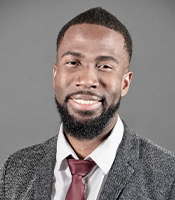
Dr. Oyita Udiani is an assistant professor at Virginia Commonwealth University. He was born in Lagos, Nigeria and immigrated to the United States as a young teenager. After completing high school, Dr. Udiani received a scholarship to study mathematics at Saint Augustine’s University, a historically Black college in Raleigh, NC. He later went on to earn a master’s degree from The Ohio State University and his doctorate from Arizona State University. Dr. Udiani’s research has focused on complex adaptive systems, ecology, public health, and collective behavior. He is proud of the many publications and grants he has gotten in his early career. Dr. Udiani is passionate about engaging minoritized communities in mathematics through his teaching, one-on-one mentoring, and public-speaking events. He wants people to know that, regardless of what your dreams are, the ability to think creatively, logically, and abstractly is necessary to bring you to life. This is what math is about!
Why did you apply for this fellowship?
I applied for the MSEC Fellowship as a means to grow my professional network.
What are you most looking forward to as an MSEC Fellow?
I am eager to expand my circle of collaborators in the SIAM community. I hope to contribute to the SIAM community through productive scholarship and being an advocate for students of color in the mathematical sciences.
Stay Up-to-Date with Email Alerts
Sign up for our monthly newsletter and emails about other topics of your choosing.



